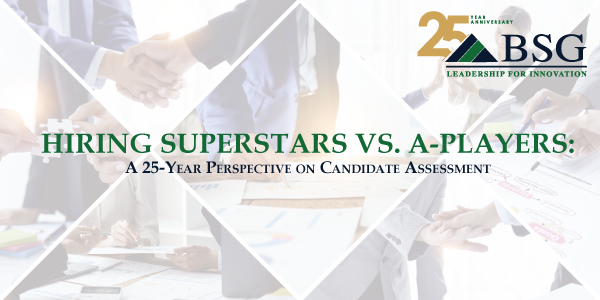
The inspiration for this article came from reading an enlightening Harvard Business Review piece titled "The Risky Business of Hiring Stars" (https://hbr.org/2004/05/the-risky-business-of-hiring-stars). The HBR article underscored the risks associated with hiring superstars from other organizations, challenging the notion of a simple "plug-and-play" approach.
So, if that's not the answer, what is?
This led me to ponder the alternative – hiring "A-players." But what does that entail? How can we distinguish real talent from impostors? What are the critical qualities that define exceptional leaders, and how can we avoid the pitfalls that hinder effective hiring?
After founding and operating a boutique retained search firm for 25 years, conducting thousands of executive candidate interviews, I've distilled the following insights from my extensive experience:
What Matters More:
- Emotional Intelligence (EQ) trumps Intelligence Quotient (IQ).
- Consider the context of the job – is it a turnaround, growth, or a smoothing-out endeavor?
- Cultural fit is paramount; success in one environment doesn't guarantee success in another.
- Prioritize humility over hubris and mastery over ego.
- Foster curiosity, akin to a child's wonder about "how things work."
- Attitude and aptitude outweigh specific skills.
- Seek intrinsic motivation over extrinsic rewards.
- Evaluate the candidate's upbringing.
- Value experience and belief in a "test and learn" approach.
- Assess the candidate's ability to create an "abstraction layer" of meta-concepts.
- Look for individuals with a team following.
- Promote a mentor-teacher approach for employee development and internal promotions.
- Gauge situational leadership skills.
- Ensure candidates have a healthy stress management mechanism.
What Matters Less:
- Charisma should not be the primary focus.
- Pedigree does not always correlate with performance.
- Beware of quick hiring decisions – humans tend to decide too hastily.
- Prior bulletproof success is essential but not all-encompassing.
Cardinal Interviewing Rule: "Trust, but verify"
- Ask behavior-based questions to confirm a candidate's past actions.
- Thoroughly check references and perform background checks for verification.
Post-Hire Considerations:
Accelerators:
- Implement two-way coaching for the new hire.
- Establish a feedback loop to address any issues promptly.
- Define clear deliverables through a scorecard.
Retardants:
- Avoid self-onboarding assumptions.
- Be cautious with "change-agent" hiring – cultural shifts can be challenging and may require personnel changes.
Hiring a "change agent" should involve granting autonomy and resources to effect real change. The process of cultural migration can vary in difficulty, and careful planning is essential for success.
In conclusion, the hiring process is a nuanced journey that goes beyond traditional qualifications. Prioritizing qualities like emotional intelligence, humility, and adaptability can lead to more successful hires, while a measured approach to cultural change can ensure a smooth transition in the workplace.




